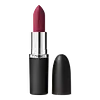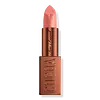What's inside
What's inside
 Key Ingredients
Key Ingredients

 Benefits
Benefits

 Concerns
Concerns

 Ingredients Side-by-side
Ingredients Side-by-side

Octyldodecanol
EmollientNeopentyl Glycol Diheptanoate
EmollientSynthetic Wax
AbrasivePentaerythrityl Tetraisostearate
EmollientTrimethylpentanediol/Adipic Acid/Glycerin Crosspolymer
Skin ConditioningSilica
AbrasiveMicrocrystalline Wax
Emulsion StabilisingEuphorbia Cerifera Wax
Butyrospermum Parkii Butter
Skin ConditioningCocos Nucifera Oil
MaskingKaolin
AbrasiveBis-Diglyceryl Polyacyladipate-2
EmollientCopernicia Cerifera Wax
Boron Nitride
AbsorbentTheobroma Cacao Seed Butter
EmollientPolyglyceryl-3 Diisostearate
EmulsifyingMethicone
EmollientDisteardimonium Hectorite
StabilisingPropylene Carbonate
SolventLecithin
EmollientVanillin
MaskingPentaerythrityl Tetra-Di-T-Butyl Hydroxyhydrocinnamate
AntioxidantMica
Cosmetic ColorantCI 77891
Cosmetic ColorantCI 77491
Cosmetic ColorantCI 77492
Cosmetic ColorantCI 77499
Cosmetic ColorantCI 15850
Cosmetic ColorantCI 45410
Cosmetic ColorantCI 73360
Cosmetic ColorantCI 17200
Cosmetic ColorantCI 19140
Cosmetic ColorantCI 42090
Cosmetic ColorantCI 15985
Cosmetic ColorantOctyldodecanol, Neopentyl Glycol Diheptanoate, Synthetic Wax, Pentaerythrityl Tetraisostearate, Trimethylpentanediol/Adipic Acid/Glycerin Crosspolymer, Silica, Microcrystalline Wax, Euphorbia Cerifera Wax, Butyrospermum Parkii Butter, Cocos Nucifera Oil, Kaolin, Bis-Diglyceryl Polyacyladipate-2, Copernicia Cerifera Wax, Boron Nitride, Theobroma Cacao Seed Butter, Polyglyceryl-3 Diisostearate, Methicone, Disteardimonium Hectorite, Propylene Carbonate, Lecithin, Vanillin, Pentaerythrityl Tetra-Di-T-Butyl Hydroxyhydrocinnamate, Mica, CI 77891, CI 77491, CI 77492, CI 77499, CI 15850, CI 45410, CI 73360, CI 17200, CI 19140, CI 42090, CI 15985
Octyldodecanol
EmollientPentaerythrityl Tetraisostearate
EmollientPolybutene
Polyglyceryl-2 Triisostearate
EmulsifyingMicrocrystalline Wax
Emulsion StabilisingEuphorbia Cerifera Wax
Bis-Diglyceryl Polyacyladipate-2
EmollientSilica
AbrasiveOzokerite
Emulsion StabilisingDicalcium Phosphate
AbrasiveParfum
MaskingCaprylic/Capric Triglyceride
MaskingCymbidium Grandiflorum Flower Extract
Skin ConditioningPolyhydroxystearic Acid
EmulsifyingDisteardimonium Hectorite
StabilisingBenzyl Alcohol
PerfumingPentaerythrityl Tetra-Di-T-Butyl Hydroxyhydrocinnamate
AntioxidantCI 77891
Cosmetic ColorantCI 77491
Cosmetic ColorantCI 77492
Cosmetic ColorantCI 77499
Cosmetic ColorantCI 15985
Cosmetic ColorantCI 15850
Cosmetic ColorantOctyldodecanol, Pentaerythrityl Tetraisostearate, Polybutene, Polyglyceryl-2 Triisostearate, Microcrystalline Wax, Euphorbia Cerifera Wax, Bis-Diglyceryl Polyacyladipate-2, Silica, Ozokerite, Dicalcium Phosphate, Parfum, Caprylic/Capric Triglyceride, Cymbidium Grandiflorum Flower Extract, Polyhydroxystearic Acid, Disteardimonium Hectorite, Benzyl Alcohol, Pentaerythrityl Tetra-Di-T-Butyl Hydroxyhydrocinnamate, CI 77891, CI 77491, CI 77492, CI 77499, CI 15985, CI 15850
Ingredients Explained
These ingredients are found in both products.
Ingredients higher up in an ingredient list are typically present in a larger amount.
This ingredient is lipid-based synthetic skin-conditioning agent derived from adipic acid and a mixture of fatty acids. It is often called a lanolin substitute.
As an emollient, it helps soften and hydrate the skin. Emollients create a barrier on the skin to trap moisture in.
Due to its fatty acid base, it may not be Malassezia folliculitis safe.
Learn more about Bis-Diglyceryl Polyacyladipate-2Ci 15850 is the pigment color red. It is an azo dye and created synthetically.
Azo dyes need to be thoroughly purified before use. This allows them to be more stable and longer-lasting.
This ingredient is common in foundations, lipsticks, and blushes. This color is described as brown/orangey red.
It has many secondary names such as Red 6 and Red 7. According to a manufacturer, Red 6 usually contains aluminum.
Learn more about CI 15850Ci 15985 is a dye made from petroleum. It is synthetically created and approved by the FDA for use in foods and cosmetics.
The color of this dye is orange/yellow.
This ingredient can be found in makeup, sun care, and skincare.
Learn more about CI 15985Ci 77491 is also hydrated iron III oxide. It's sole purpose is to give a red/pink hue to products.
Iron III oxides are classified as inorganic chemicals for coloring.
Synthetically created Ci 77491 is considered safer than those naturally found. This is because the synthetically created version may contain less impurities. Iron oxides are generally non-toxic and non-allergenic.
Learn more about CI 77491Ci 77492 is also hydrated iron III oxide. It's sole purpose is to give a yellow hue to products.
Iron III oxides are classified as inorganic chemicals for coloring.
Synthetically created Ci 77492 is considered safer than those naturally found. This is because the synthetically created version may contain less impurities. Iron oxides are generally non-toxic and non-allergenic.
Learn more about CI 77492Ci 77499 is also hydrated iron III oxide. It is created from mixing red and black iron oxides. This helps give shades of darkness to a product.
Iron III oxides are classified as inorganic chemicals for coloring.
Ci 77891 is a white pigment from Titanium dioxide. It is naturally found in minerals such as rutile and ilmenite.
It's main function is to add a white color to cosmetics. It can also be mixed with other colors to create different shades.
Ci 77891 is commonly found in sunscreens due to its ability to block UV rays.
Learn more about CI 77891Disteardimonium Hectorite comes from the clay mineral named hectorite. It is used to add thickness to a product.
It can also help stabilize a product by helping to disperse other ingredients.
Hectorite is a rare, white clay mineral.
Learn more about Disteardimonium HectoriteMicrocrystalline Wax is created by de-oiling petroleum. It is highly refined and purified before being added to cosmetics.
Microcrystalline Wax is used to enhance the texture and create even consistency. It helps stabilize a product by preventing ingredients from separating.
Octyldodecanol is a fatty alcohol. It is primarily used to enhance the texture of products.
As an emulsifier, Octyldodecanol helps prevent the oils and waters from separating. It also prevents ingredients from creating foam when shaken.
Octyldodecanol is created by reducing fatty acid to an alcohol.
Due to its high molecular weight, it does not get absorbed into the skin.
Learn more about OctyldodecanolPentaerythrityl Tetra-Di-T-Butyl Hydroxyhydrocinnamate (long name, huh?) is a synthetic antioxidant.
It is used to help stabilize other antioxidants or prevent the color from changing in a product.
As an antioxidant, it helps fight free-radical molecules. Free-radical molecules are capable of damaging our cells and other genetic material. Thus, antioxidants may reduce the signs of aging.
This ingredient is oil-soluble.
Learn more about Pentaerythrityl Tetra-Di-T-Butyl HydroxyhydrocinnamatePentaerythrityl Tetraisostearate is derived from isostearic acid. It is an emollient and emulsifier.
The highest concentration of this ingredient is found in lipsticks.
This ingredient is minimally water soluble and may not be Malassezia folliculitis, or fungal-acne safe.
Learn more about Pentaerythrityl TetraisostearateSilica, also known as silicon dioxide, is a naturally occurring mineral. It is used as a fine, spherical, and porous powder in cosmetics.
Though it has exfoliant properties, the function of silica varies depending on the product.
The unique structure of silica enhances the spreadability and adds smoothness, making it a great texture enhancer.
It is also used as an active carrier, emulsifier, and mattifier due to its ability to absorb excess oil.
In some products, tiny microneedles called spicules are made from silica or hydrolyzed sponge. When you rub them in, they lightly polish away dead skin layers and enhance the penetration of active ingredients.
Learn more about SilicaEuphorbia Cerifera wax comes from a shrub in Northern Mexico. It is used to stabilize formulations and has emollient properties.
Emollients form a thin layer on top of skin to prevent water from evaporating, keeping skin and lips hydrated.
According to a manufacturer, this wax can range from a yellow/brown color to translucent.
Learn more about Euphorbia Cerifera Wax